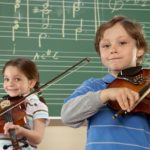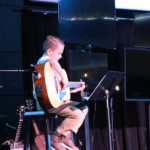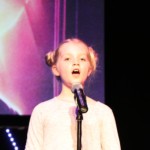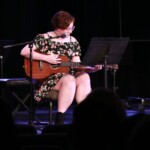From the complex sound of a Bach fugue to the catchy pop songs of the Beatles, music and mathematics overlap in a lot of different ways. Music and math have a close relationship that goes back thousands of years to the origins of music and civilization. Of course, you do not need to know your times tables in order to play more beautifully, but numbers and patterns help us to understand the structure of music and more! We use numbers and math to teach music everyday. Listed below are four ways that math and music are related.
Reading music is related to math
Numbers tell us a lot of information about a piece of music. Music is divided in sections called measures and each measure has equal amounts of beats. These are the same as mathematical divisions of time. Each piece of music as a time signature that gives rhythmic information about the piece, such as how many beats are in each measure. A time signature is like a fraction, with one number on top and one on the bottom. All of the notes and rests in music have numerical connections as well because they each have a certain amount of beats. It is important for musicians to understand the value of these fractions and notes in order the count the music correctly.
The frequency of sound is related to math
Pythagoras, the Greek philosopher and mathematician, realized that different sounds can be made up with different weights and vibrations. This led to the discovery that the pitch of a vibrating string, such as on a violin, guitar, or piano, can be controlled by it’s length. The shorter the string, the higher the pitch and the longer the string the lower the pitch.
Patterns are used both in music and math
Probably the closest connection between music and math is that they both use patterns. Music has repeating choruses and sections of songs and in math patterns are used to explain and predict the unknown. Mathematics in the study of patterns, and you can study everything in music from different mathematical perspectives, including geometry, number theory, trigonometry, differential calculus, and signal processing. Research has even shown that certain pieces of music end up being more popular due to their mathematical structure. For example, Pachelbel’s Canon in D, which is used in many weddings every year, is said to be more popular with people because of its repetitive structure. It’s our innate need as humans for rhythm and patterns. That could be why a lot of the pop music we hear on the radio today has so much repetition!
Music affects how we study and think
An article researched by Dr. Frances Rauscher of the University of Wisconsin Oshkosh says that when young children are provided with instruction on musical instruments, they score much higher on tasks measuring spatial-temporal cognition, hand-eye coordination, and arithmetic. Part of this is because of the overlap between math skills and music skills. The concept that is necessary for understanding fractions, decimals, and percents is relevant in understanding rhythm. A literate musician is required to continually subdivide beats to arrive at the correct interpretation of rhythmic notation. The visual and special skills that a child exercises every time they practice strengthens their mental-physical connection. The slow work of practice, paying attention to details, and the discipline it takes to learn an instrument are preparation for building strong math skills.
Research also shows that children who learn their academics through music retain the information better then those who learn the same concepts by verbal instruction. When memorizing facts or figures, it is easier to remember the information when putting it into a rhyme or song. These catchy, musical elements will provide a hook to help a person recall these important details in a stressful situation. Playing music in the background while doing homework can create a highly focused learning state as well. Slow tempo music can create an atmosphere of focus that leads to deep concentration. Learning vocabulary , memorizing facts or reading to this music is highly effective.
Music is very helpful when it comes to learning mathematics or any other academic area. Bring a little music into your life today and see how your intellect can soar! Register for music lessons at OSMD. We teach voice and just about any instrument imaginable!



